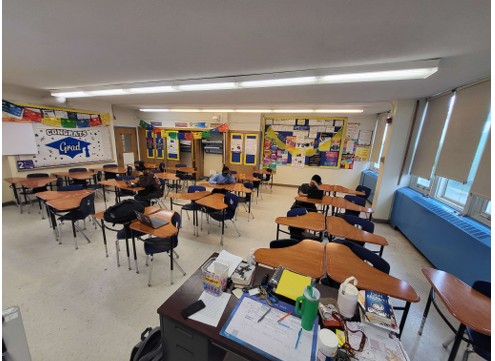Included in the incoming president Donald Trump’s official policy agenda, dubbed Agenda 47, Mr. Trump pledges to eliminate the federal Department of Education (DOE).
The federal DOE distributes funding for many public schools, including Edison. The department distributes funding for Pell Grants, student loans, special education, and Title 1, among other things. 5% of Edison’s budget comes from Title 1 funds, amounting to over $1.5 million, with an additional 1% allocated to the school for other purposes. It is unclear what could happen to schools and that federal funding if the DOE is taken out of the picture. Some of our school’s funding may be put in jeopardy in the near future.
Title 1 gives our school “About a million dollars that is used for support for those students that fall under Title 1. So that would be tutoring, PM, school after school programs,” Mr. Ojeda said.
Mr. Ojeda added that with this funding, the school is able to run “workshops or support for families that are Title 1. They did an executive functioning workshop on how to help kids study better and how to help their child do better in school, so those are the kinds of things they’ll do. Sometimes it’s a CPR course.”
“That money is used to buy Chromebooks, buy supplies, and buy materials,” Dr. Collado said.
If Edison loses this funding, it would be harder for the school to provide those services and materials for students and parents.
Many students and staff here at Edison have given their thoughts about the proposal to eliminate the DOE.
“I don’t think there’s any traction yet, and so, therefore, I don’t have much to say on it, except for the fact that I do know being in the DOE for thirty-one years than any change or, any thought of change takes a long time, and if it’s even successful,” Mr. Ojeda said.
After conducting several interviews, including Principal Ojeda and other school staff, we came to the conclusion that it is still too early to tell what could happen to the education system because we don’t know what would replace the DOE.
Although it may be too early to determine what will happen to the education system, many things can happen regardless of what replaces the DOE. Even if the funds are transferred to other agencies, there are doubts about whether those agencies can match the DOE’s reach and effectiveness in meeting the specific needs of schools.
Ms. Dellabonta, history teacher, raised serious concerns about the broader implications of eliminating the DOE.
“Low-income families are typically impacted most by the funding that comes from the federal budget designated to the DOE,” Ms. Dellabonta said.
If the DOE were dissolved, she warned that students with special needs—such as those with IEPs and 504 plans—could face a significant reduction in the support they currently receive.
“Students that have special needs, such as students with disabilities, this is where I fear NYC and especially students/families will feel the most impact,” Ms. Dellabonta said.
Additionally, Ms. Dellabonta pointed out that essential services like occupational therapy, speech therapy, and school psychologists, which are often funded through the federal government, could be eliminated or privatized.
“Those services could be obtained privately for students, but that once again depicts a lack of support for lower-income families who may not have the ability to access those services elsewhere,” Dellabonta explained.
Ms. Dellabonta raised concerns about the potential loss of Pell Grants, which help low-income students afford higher education, adding, “The ripple effect this would have on education as a whole in NY is great.”
In addition to the impact on students and families, Ms. Dellabonta also highlighted potential consequences for the staffing within Edison.
“I think more of the upper-level positions in Education (such as superintendents, Assistant Principals) would be more impacted and possibly some central office employees that the Republicans would argue are ‘excess fat’—meaning those positions could be consolidated into having one superintendent for several districts, or deputy assistant positions would be dissolved,” Dellabonta said.
As the future of the DOE remains uncertain, a major concern is how schools will cope with the potential loss of federal guidance and funding. While Edison has managed to provide valuable programs and resources to its students, part of this success is tied to the support the school receives from the federal government.
Without these resources, schools may be forced to make difficult decisions, potentially eliminating enrichment programs or cutting services that are important for students’ well-being and academic success.
Mr. Ojeda remains confident that our school will remain successful despite the threat to some of its funding. He is often able to get extra money for the school through grants from the city or state.
“I’ve brought programs in, I’m able to get funding, all that set and apart from the daily duties of the DOE, AKA NYCPS, so for me, I don’t think it would affect us,” said Mr. Ojeda.
While Edison may be able to adapt, the larger implications of dismantling the federal department are still uncertain, and drastic changes could ultimately disrupt the broader educational system, specifically schools that rely on federal support more than ours.










Amanda Vender • Mar 17, 2025 at 4:05 pm
Great article! It would be nice to hear more from the Edison students in addition to the staff. This is a really important topic to be covering now. Wouldn’t it take an act of Congress to end the federal DOE?
steven cawley • Feb 11, 2025 at 7:20 pm
Trump will make more improvements than Biden could ever do
I graduated 1970. Worked NY City Housing Auth. Very successful career. Much of it the result of Edison.